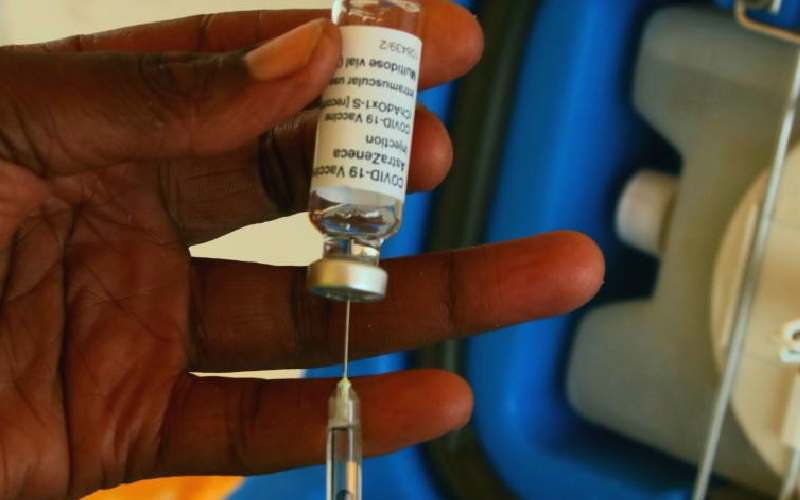
A nurse holding the syringe and covid 19 vaccine during Covid 19 vaccination of kariobangi residents. [David Gichuru, Standard]
The ongoing vaccination program in Kenya and other low-income countries may receive a hitch, following the shortage of syringes for vaccination.
The United Nations Children’s Fund (UNICEF) announced that there will be a shortage of vaccines globally, by 2022.
In a statement, UNICEF said there could be a shortfall of up to 2.2 billion auto-dispensable syringes, as per its projection.
“Without action now, the world could face a serious shortage of COVID vaccine syringes by the end of 2022, with potentially dire consequences for the global effort to bring the pandemic under control,” UNICEF Executive Director Henrietta Fore, said.
This shortage would hit the type of syringes that lock automatically to prevent reuse, as required by WHO and UNICEF guidelines, the brunt of which will hit low and middle-income countries, where this type of syringe is critical for safety.
UNICEF has attributed the shortage to significantly higher demand, disruptions to international freight and supply chains, an unpredictable supply of vaccines due to a significant reliance on much needed donated doses and national bans on syringe exports.
The syringes are similar to those procured by UNICEF for the vaccination of children globally, against six killer diseases namely polio, measles, tuberculosis (TB), diphtheria, tetanus and whooping cough.
“Working closely with partners, UNICEF has been leading the charge. We tripled the number of syringes ordered to meet demand – securing almost three billion auto-disable syringes since 2020, including the creation of a GAVI-funded stockpile of half a billion syringes to prepare for the COVID-19 vaccine rollout,” added the statement.
As mitigation, UNICEF is working with key partners namely United States, COVAX, PATH, donors, syringe manufacturers and others, to take necessary actions to address the situation as they monitor progress.
“We are working to get the most out of our existing arrangements and to sign new agreements with syringe suppliers that are able to step up to the challenge in 2022,”
The announcement comes at a time Kenya, and African countries have failed to meet targets of vaccinating at least 10 per cent of the population, as set by the World Health Organisation (WHO).
WHO is appealing for funding of Sh23.4 billion dollars from the world’s 20 biggest economies, to help create herd immunity.
Dr Matshidiso Moeti, the WHO regional director for Africa noted the need to have more funding.
“In order to avert the likely effects of shortages of important commodities, WHO and other aid groups have called for additional funding towards the access to COVID-19 Tools Accelerator program,” said the official.
Most African countries lag behind in achieving the 40 per cent vaccination targets, set by the World Health Assembly, in May this year.
Less than five per cent of the African population are fully vaccinated, yet wealthy countries have started administering booster shots and vaccinating children.
The US Food and Drug Administration authorized the Covid-19 vaccine for children aged between five and eleven years.
WHO Director General, Dr Tedros Adhanom attributed the shortfall in reaching targets to an inadequate supply of vaccines.
By yesterday, Kenya had administered about 5.3 million vaccines doses of which, 3.6 million partially vaccinated. Only 1.6 million Kenyans have been fully vaccinated.
“Uptake of the second dose among those who have received their first dose was 41.7 per cent. the proportion of adults fully vaccinated was six per cent,” noted a statement by the Ministry of Health.
The government is working towards vaccinating at least 10 million people by December, out of the total target of 27 million adults, to create herd immunity.
Through the Covax Facility led by Gavi, the Vaccine Alliance, WHO and CEPI-UNICEF have been working with manufacturers and partners on the procurement of vaccine doses, as well as freight logistics and storage in the fight against the global pandemic.
Kenya is among countries that have received vaccines, through the Covax facility.
 The Standard Group Plc is a multi-media organization with investments in media platforms spanning newspaper print
operations, television, radio broadcasting, digital and online services. The Standard Group is recognized as a
leading multi-media house in Kenya with a key influence in matters of national and international interest.
The Standard Group Plc is a multi-media organization with investments in media platforms spanning newspaper print
operations, television, radio broadcasting, digital and online services. The Standard Group is recognized as a
leading multi-media house in Kenya with a key influence in matters of national and international interest.











